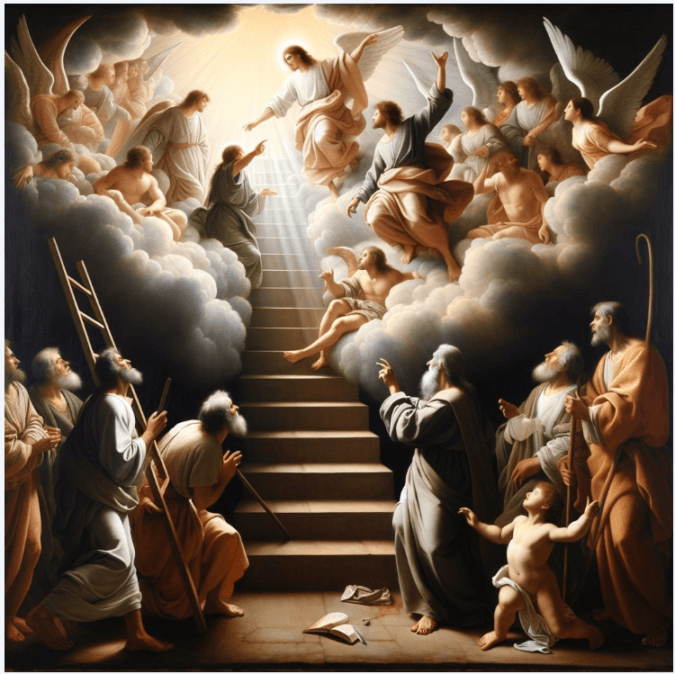GOD APPEARS TO JACOB AT BETHEL
At Bethel, Jacob had a wonderful dream in which he saw a ladder or staircase extending from earth to heaven.
This suggested “the fact of a real, uninterrupted, and close communion between heaven and earth, and in particular between God in His glory and man in his solitude.”
In His encounter with Nathanael, the Lord Jesus made an apparent reference to this incident and connected it with His Second Advent and millennial glory (John 1:51).
But believers even now can enjoy moment-by-moment fellowship with the Lord.
At this time when Jacob’s heart was probably filled with regret for the past, loneliness in the present, and uncertainty about the future, God graciously made a covenant with him as He had with Abraham and Isaac.
Notice the promise of:
- companionship: “I am with you”;
- safety: “I will keep you wherever you go”;
- guidance: “and will bring you back to this land”;
- and personal guarantee: “I will not leave you until I have done what I have spoken to you.”
Conscious that he had met God there, Jacob changed the name of the place from Luz (separation) to Bethel (house of God).
Genesis 28:10-17 KJV
[10] And Jacob went out from Beer–sheba, and went toward Haran.
[11] And he lighted upon a certain place, and tarried there all night, because the sun was set; and he took of the stones of that place, and put them for his pillows, and lay down in that place to sleep.
[12] And he dreamed, and behold a ladder set up on the earth, and the top of it reached to heaven: and behold the angels of God ascending and descending on it.
[13] And, behold, the LORD stood above it, and said, I am the LORD God of Abraham thy father, and the God of Isaac: the land whereon thou liest, to thee will I give it, and to thy seed;
[14] And thy seed shall be as the dust of the earth, and thou shalt spread abroad to the west, and to the east, and to the north, and to the south: and in thee and in thy seed shall all the families of the earth be blessed.
[15] And, behold, I am with thee, and will keep thee in all places whither thou goest, and will bring thee again into this land; for I will not leave thee, until I have done that which I have spoken to thee of.
[16] And Jacob awaked out of his sleep, and he said, Surely the LORD is in this place; and I knew it not.
[17] And he was afraid, and said, How dreadful is this place! this is none other but the house of God, and this is the gate of heaven.
Genesis 28:10 KJV
And Jacob went out from Beer–sheba, and went toward Haran.
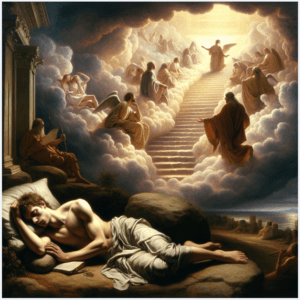 His departure from his father‘s house was an ignominious flight; and for fear of being pursued or waylaid by his vindictive brother, he did not take the common road, but went by lonely and unfrequented paths, which increased the length and dangers of the journey.
His departure from his father‘s house was an ignominious flight; and for fear of being pursued or waylaid by his vindictive brother, he did not take the common road, but went by lonely and unfrequented paths, which increased the length and dangers of the journey.
Isaac had settled his household in Beersheba in the land of Canaan promised by God to Abraham. Jacob had grown up there. Now he leaves, heading toward Haran, where Abraham first heard promises from God (Genesis 12:1-3).
Haran is the town where Laban, Rebekah’s brother, lives. Jacob had two reasons for leaving.
First and foremost, his older twin brother, Esau, had resolved to kill Jacob for tricking their father and stealing a blessing intended for Esau (Genesis 27:41).
Second, Jacob had been instructed by his father to return to their ancestral homeland in order to find a suitable wife.
Genesis 28:11 KJV
And he lighted upon a certain place, and tarried there all night, because the sun was set; and he took of the stones of that place, and put them for his pillows, and lay down in that place to sleep.
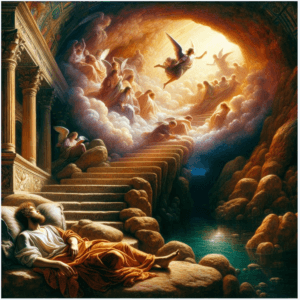 By a forced march he had reached Beth-el, about forty-eight miles from Beer-sheba, and had to spend the night in the open field. The nature of the soil is an existing comment on the record of the stony territory where Jacob lay.
By a forced march he had reached Beth-el, about forty-eight miles from Beer-sheba, and had to spend the night in the open field. The nature of the soil is an existing comment on the record of the stony territory where Jacob lay.
This verse raises several questions.
Was Jacob not well prepared for this journey?
Did he leave in a great hurry?
Or was he far from any place where he could more safely spend the night than alone on the ground with a stone for his pillow?
It seems somewhat odd that the son of a man as wealthy as Isaac is apparently traveling with no servants or larger company. At least, Scripture gives us no indication of others travelling with him.
Previously, Jacob was encouraged to flee his homeland by his mother, to escape the murderous rage of his twin brother Esau (Genesis 27:41). This was then reinforced by his father telling him to return to the family’s ancestral home to seek a wife (Genesis 28:1–2).
Whether through haste, poor planning, or some other circumstance, this passage presents Jacob as a man alone in the desert, vulnerable to what may come. When it gets dark, he is forced to stop for the night.
He grabs a stone, lays his head on it, and goes to sleep. He did not yet know that the place he slept would become such a significant place in the story of God’s relationship with Israel.
Genesis 28:12 KJV
And he dreamed, and behold a ladder set up on the earth, and the top of it reached to heaven: and behold the angels of God ascending and descending on it.
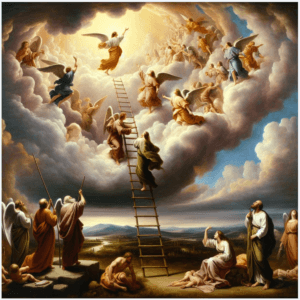 And behold a ladder — Some writers are of opinion that it was not a literal ladder that is meant, as it is impossible to conceive any imagery stranger and more unnatural than that of a ladder, whose base was on earth, while its top reached heaven, without having any thing on which to rest its upper extremity.
And behold a ladder — Some writers are of opinion that it was not a literal ladder that is meant, as it is impossible to conceive any imagery stranger and more unnatural than that of a ladder, whose base was on earth, while its top reached heaven, without having any thing on which to rest its upper extremity.
They suppose that the little heap of stones, on which his head reclined for a pillow, being the miniature model of the object that appeared to his imagination, the latter was a gigantic mountain pile, whose sides, indented in the rock, gave it the appearance of a scaling ladder.
There can be no doubt that this use of the original term was common among the early Hebrews; as Josephus, describing the town of Ptolemais (Acre), says it was bounded by a mountain, which, from its projecting sides, was called “the ladder,” and the stairs that led down to the city are, in the original, termed a ladder (Nehemiah 3:15) though they were only a flight of steps cut in the side of the rock.
But whether the image presented to the mental eye of Jacob were a common ladder, or such a mountain pile as has been described, the design of this vision was to afford comfort, encouragement, and confidence to the lonely fugitive, both in his present circumstances and as to his future prospects.
His thoughts during the day must have been painful – he would be his own self-accuser that he had brought exile and privation upon himself – and above all, that though he had obtained the forgiveness of his father, he had much reason to fear lest God might have forsaken him.
Solitude affords time for reflection; and it was now that God began to bring Jacob under a course of religious instruction and training.
To dispel his fears and allay the inward tumult of his mind, nothing was better fitted than the vision of the gigantic ladder, which reached from himself to heaven, and on which the angels were continually ascending and descending from God Himself on their benevolent errands (John 1:51).
Jacob has fled his home in Canaan, both to escape the wrath of his brother Esau (Genesis 27:41) and to find a wife among his people in Mesopotamia (Genesis 28:1–2).
Apparently, Jacob either left too quickly to gather supplies, or simply did not plan well and found himself out in the wilderness at night without aid.
Sleeping with his head on a stone on the ground, Jacob begins to dream. As the Lord did with Abraham (Genesis 15:12), He will now appear to Jacob in a dream.
He will reaffirm, in person to Jacob, that all of the covenant promises made to Abraham will be for him, as well.
As the dream begins, Jacob sees a structure connecting earth to heaven. The Hebrew word for this object is sul’lam, which appears only here in the Bible. The term is often translated as “ladder,” but it could possibly be interpreted as a “staircase.”
Either way, this construction is occupied by God’s angels ascending and descending. The text states this with a sense of astonishment, perhaps expressing the feelings of Jacob in the dream.
Genesis 28:13 KJV
And, behold, the LORD stood above it, and said, I am the LORD God of Abraham thy father, and the God of Isaac: the land whereon thou liest, to thee will I give it, and to thy seed;
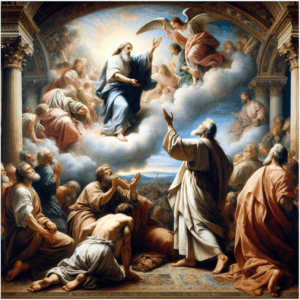 That Jacob might be at no loss to know the purport of the vision, he heard the divine voice; and the announcement of His name, together with a renewal of the covenant, and an assurance of personal protection, produced at once the most solemnizing and inspiriting effect on his mind.
That Jacob might be at no loss to know the purport of the vision, he heard the divine voice; and the announcement of His name, together with a renewal of the covenant, and an assurance of personal protection, produced at once the most solemnizing and inspiriting effect on his mind.
Jacob is sleeping in the wilderness, apparently alone, and with only a rock for a pillow. He is on the way to his family’s previous homeland in Mesopotamia, both to escape his enraged brother (Genesis 27:41) and to seek a wife (Genesis 28:1–2).
While asleep, Jacob is presented with a powerful, unusual dream. The Lord Himself is using this dream to visit Jacob and deliver a moving and personal message.
First, the Lord identifies Himself from the top of a “ladder” or “staircase” that reaches from earth to heaven. God assures Jacob that He is, in fact, the God of Abraham, and of Jacob’s own father Isaac.
He is the same Lord, and He has come to deliver the same words to Jacob as He did to His grandfather. To begin with, the Lord will give to Jacob and his descendants the very ground on which he is lying.
In this way, the Lord acknowledges Jacob’s experience while lying there asleep was both a dream and a genuine visitation from God.
Genesis 28:14 KJV
And thy seed shall be as the dust of the earth, and thou shalt spread abroad to the west, and to the east, and to the north, and to the south: and in thee and in thy seed shall all the families of the earth be blessed.
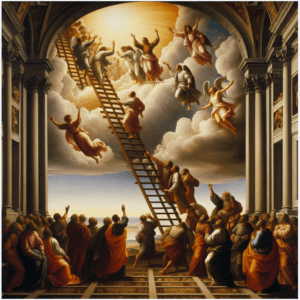 Now God is giving to Jacob exactly what He had given first to Abraham; He had repeated it to Isaac, and now He confirms it, and He reaffirms to Jacob that He will do this.
Now God is giving to Jacob exactly what He had given first to Abraham; He had repeated it to Isaac, and now He confirms it, and He reaffirms to Jacob that He will do this.
Jacob has fled his homeland in Canaan, avoiding his enraged brother (Genesis 27:41) and seeking a wife in his family’s ancestral territory (Genesis 28:1–2).
While sleeping alone in the wilderness with a rock for a pillow, Jacob experiences a fantastic dream, showing him a ladder, or staircase, full of angels (Genesis 28:10–12).
Through this dream, God speaks to Jacob and delivers promises much like those given to Abraham and Isaac. One has to wonder if Jacob has heard these words before.
Had Abraham or Isaac ever quoted to Jacob these promises from God? We don’t know, though Isaac had said somewhat similar things to him in delivering the blessing of Abraham before sending Jacob off on this journey.
In any case, the Lord does say to Jacob nearly the exact words He said to Abraham. Jacob’s offspring will become as the dust of the earth (Genesis 13:16). They will spread in every direction across the land.
However, they will not only conquer and occupy. Through Jacob’s descendants, all the people of the earth would be blessed (Genesis 12:3).
Many interpreters see this promise—to bless all the people of the earth through the descendants of Abraham and Jacob—as the Lord pointing forward to Jesus Christ.
Jesus, the Savor and Messiah, will make it possible for people of every family and nation to become the people of God. Jesus will be one of the direct descendants of Abraham, Jacob, and their offspring.
Genesis 28:15 KJV
And, behold, I am with thee, and will keep thee in all places whither thou goest, and will bring thee again into this land; for I will not leave thee, until I have done that which I have spoken to thee of.
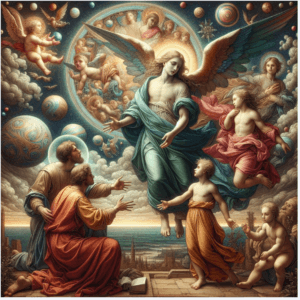 You can see that this would be comforting and helpful to a lonesome, homesick boy who really had to leave home in a hurry. He is on his way to a far country, and this first night God says to him, “I’m going to be with you, Jacob, and I’m going to bring you back to this land.”
You can see that this would be comforting and helpful to a lonesome, homesick boy who really had to leave home in a hurry. He is on his way to a far country, and this first night God says to him, “I’m going to be with you, Jacob, and I’m going to bring you back to this land.”
The vision that God gave to him in the dream was of a ladder that reached up to heaven. What does that ladder mean? Well, the Lord Jesus interpreted it when He called Nathanael, as recorded in John.
“Jesus answered and said unto him, Because I said unto thee, I saw thee under the fig tree, believest thou? thou shalt see greater things than these. And he saith unto him, Verily, verily, I say unto you, Hereafter ye shall see heaven open, and the angels of God ascending and descending upon the Son of man” (John 1:50–51).
The Lord is communicating with Jacob in a dream, as he rests his head on a rock in the wilderness (Genesis 28:10–14). In the dream, Jacob sees God standing at the top of a ladder-like structure reaching from earth to heaven.
In the previous verse, the Lord spoke to Jacob the very same promises He had made to Abraham. He would give Jacob’s descendants this land.
Those descendants would be as the dust of the earth spreading out in every direction. And through those descendants, all the peoples of the earth would be blessed.
Now the Lord gives to Jacob promises that are especially for him in this journey he is taking out of the land of Canaan. The Lord promises to personally be with Jacob wherever he goes, even into Mesopotamia.
He also promises to bring Jacob back to the land of promise. Finally, the Lord promises never to leave Jacob until His other promises are fulfilled.
It’s easy to read past these “be with you” promises, but the Lord knew that Jacob needed to hear and believe them.
Traveling from his home to a strange place to begin a new stage of his life, and seemingly alone, it would have been easy for Jacob to forget the larger purpose of his life and live in fear.
The fact that the Lord was with him in every step and had a definite plan for his future should give meaning and confidence to anyone.
In a similar way, God’s promises to never leave or forsake those who trust in Christ should help us to overcome our fearfulness about the future (Hebrews 13:5–6).
Genesis 28:16 KJV
And Jacob awaked out of his sleep, and he said, Surely the LORD is in this place; and I knew it not.
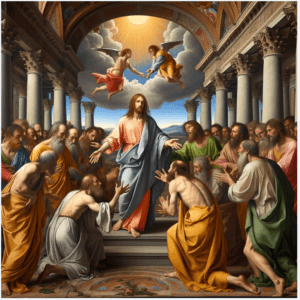 His language and his conduct were alike that of a man whose mind was pervaded by sentiments of solemn awe, of fervent piety, and lively gratitude (Jeremiah 31:36). When Jacob ran away from home, he had a limited view of God.
His language and his conduct were alike that of a man whose mind was pervaded by sentiments of solemn awe, of fervent piety, and lively gratitude (Jeremiah 31:36). When Jacob ran away from home, he had a limited view of God.
He thought that when he ran away from home, he was running away from God, also. But he found that he had not left God back home. He exclaimed, “Surely the LORD is in this place; and I knew it not!”
The Lord has appeared to Jacob in a dream, giving to him the promises of Abraham as well as a vow to be with Jacob wherever he goes and to bring him back to the land of promise (Genesis 28:10–15).
Jacob now wakes up. How will he respond to this visit from the Lord? Emotionally, he feels awe and fear. He also finds ways to worship God as he makes a powerful connection between the place he slept for the night and God’s holiness.
Here Jacob says in surprise that he didn’t realize the Lord was in this place. Modern Christians don’t tend to associate God’s holiness with physical locations. We think of God as being everywhere.
Ancient people, especially, believed that certain spots were set aside by God as places to connect with Him. God honored that idea, later instructing Israel how to treat places that contained His presence as special and holy.
Genesis 28:17 KJV
And he was afraid, and said, How dreadful is this place! this is none other but the house of God, and this is the gate of heaven.
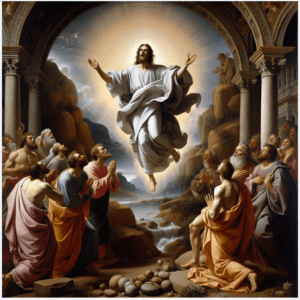 The place is dreadful only for a fellow like Jacob, a sinner, trying to run away from God. Every house of God, every church, ought to be a dreadful place to any sinner running away from God.
The place is dreadful only for a fellow like Jacob, a sinner, trying to run away from God. Every house of God, every church, ought to be a dreadful place to any sinner running away from God.
It is the place where the sinner ought to be able to meet God, come face to face with God, through the Ladder who has been sent down from heaven, even Christ.
Jacob, upon waking from a dream in which the Lord offered promises to be with him, and to extend to him the promises made to Abraham (Genesis 28:10–15), makes a powerful connection between God’s holiness and the place where the dream took place.
In the previous verse, Jacob exclaims that he did not know the Lord was in that place. Now he pronounces the place “awesome,” calling it “the house of God” and “the gate of heaven.” He will soon name the place “Bethel,” which means “house of God.”
We’re also told that Jacob is afraid. Such fear is a common and usually healthy response among people in the Bible who find themselves in the presence of God.
Overwhelmed with God’s power and holiness and a deep awareness of their own sinfulness and fragility, a worshipful fear emerges. In Jacob’s case, that fear will provoke him to worship God by honoring the place at which God visited him.
I hope that you have really enjoyed this post,
Please Leave All Comments in the Comment Box Below ↓

